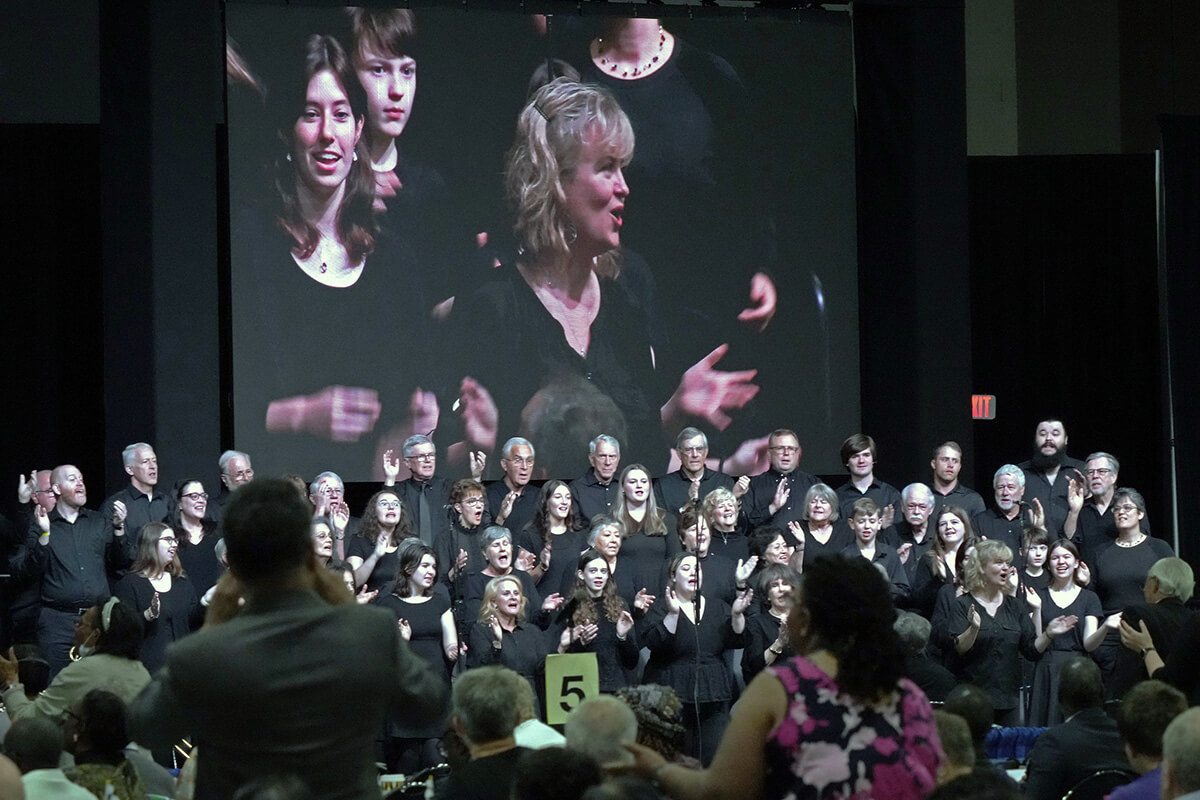On the second full day of General Conference voting, delegates fast-tracked a large number of items via the consent calendar.
Because consent calendars often contain dozens of items voted upon at once, sometimes it is hard to keep track of what was actually approved. However, the Rev. Gary Graves, secretary of the General Conference, paused the morning plenary session to make note of an important item that delegates had just passed: affirming and entering into a full communion relationship with the Episcopal Church.
LGBTQ bans slowly being eliminated

Quietly, General Conference is making historic changes to The United Methodist Church’s policies related to LGBTQ people.
Without debate, delegates voted 667-54 for the changes on the day’s consent calendar, which allows the lawmaking assembly to approve multiple pieces of legislation in bulk. To make it onto the consent calendar, petitions must receive no more than 10 “no” votes in legislative committee and have no implications for the denomination’s budget or constitution.
Some of the items passed during the April 30 morning plenary eliminate parts of the Traditional Plan passed by a vote of 438-384 at the 2019 General Conference. That package aimed at strengthening the denomination’s longtime restrictions on same-sex marriage and “self-avowed practicing” gay clergy.
This is just the beginning of possible changes to the Book of Discipline, the denomination’s policy book, during the first General Conference since a quarter of U.S. churches left the denomination.
General Conference delegates will have the chance to vote later this week on more petitions that would do away with the denomination’s longtime bans, as well as the 52-year-old stance that “the practice of homosexuality … is incompatible with Christian teaching.”
Communion with Episcopal Church gets closer
Full Communion with the Episcopal Church was approved by delegates via consent calendar during the morning plenary session. The session, during General Conference’s ecumenical day, was halted briefly to acknowledge its passage.
The announcement comes on General Conference’s “ecumenical day,” featuring a morning worship service with a sermon by the Rev. Jerry Pillay, a South African pastor in the Uniting Presbyterian Church, and news of an agreement to full communion with the Moravian Church that had passed April 29.
If the Episcopal Church affirms the agreement, which might not happen until meetings scheduled for 2027, it will mean that the two denominations recognize each other as the “one, holy, catholic and apostolic church in which the Gospel is rightly preached and taught.”
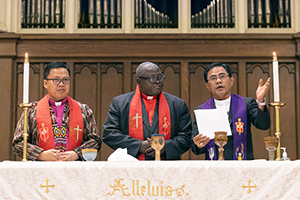
General Conference photos
General Conference reduces requested giving
Delegates voted to reduce a key component of calculating apportionments — the portion of church giving requested to fund the general-church budget.
During an afternoon session on April 30, delegates passed the new base rate for The United Methodist Church’s apportionment formula in the most contested plenary vote so far at this year’s General Conference.
As a result, conferences will shift from their current base rate of 3.29% to a base rate of 2.6% for 2025 and 2026. Then, if the apportionment collection rate is 90% or higher in those years, the base rate will jump to 2.9% for 2027 and 2028.
Bottom line: U.S. annual conferences will be asked to pay lower apportionments compared to what delegates passed at the 2016 General Conference. Also, denomination-wide ministries that rely on those apportionments — including general agencies and episcopal leadership — will need to be budgeted with those cuts in mind.
Subscribe to our
e-newsletter
General Conference will vote on the full denomination-wide budget on its final day, May 3.
More revised Social Principles pass
The United Methodist Church has now approved almost a whole new set of Social Principles.
During the morning plenary, delegates passed on the consent calendar by a vote of 667-54 three more sections of the revised Social Principles. These included a new Preamble as well as new sections on the Community of All Creation and the Economic Community. They revise Paragraphs 160 and 163 in the Book of Discipline.
With these sections’ approval, General Conference has now passed five of the six petitions containing the revised Social Principles. The petitions have all been passed with no changes from what the United Methodist Board of Church and Society submitted.
The Community of All Creation section passed today includes revised statements geared toward creation care, with teachings addressing such topics as ecological destruction, climate change, food justice and caring for all creatures.
Social Principles are not church law, but are “a prayerful and thoughtful effort” to speak with a biblical foundation to issues in the contemporary world.
Time put aside at General Conference to lament abuse
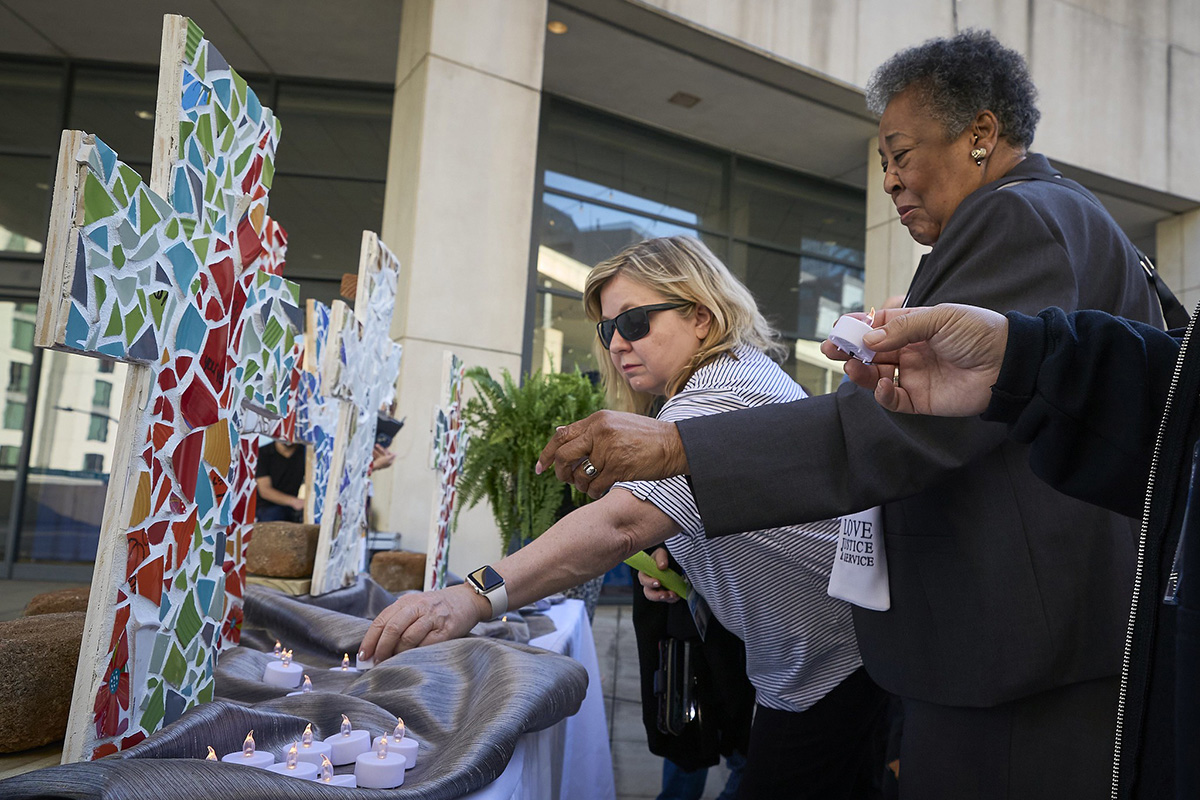
After the business at General Conference came to a close on April 29, delegates, church officials and observers gathered outdoors on a terrace of the Charlotte Convention Center to lament the damage done by sexual abusers associated with the church and the institution’s complicity.
At the lamentation service — held twice in a row to make it more convenient to attend — five crosses were displayed, with pieces from broken plates attached. The plates had been prepared in Georgia, where women who had been harmed wrote the initials of their abuser on the dishware, then wrapped the plates in towels and struck them until they broke into pieces.
“Through our brokenness, Christ is seen and able to heal us through our cracks,” said the Rev. Stephanie York Arnold, pastor of First Church Birmingham in Alabama, who led the services.
In the April 30 morning plenary session, delegates passed via consent calendar an apology from General Conference to the victims and survivors of sexual misconduct in The United Methodist Church. The resolution also encourages and supports the reporting of sexual misconduct, and states the abuse of power in the leadership position will not be tolerated.
Delegates celebrate success, growth of Africa University
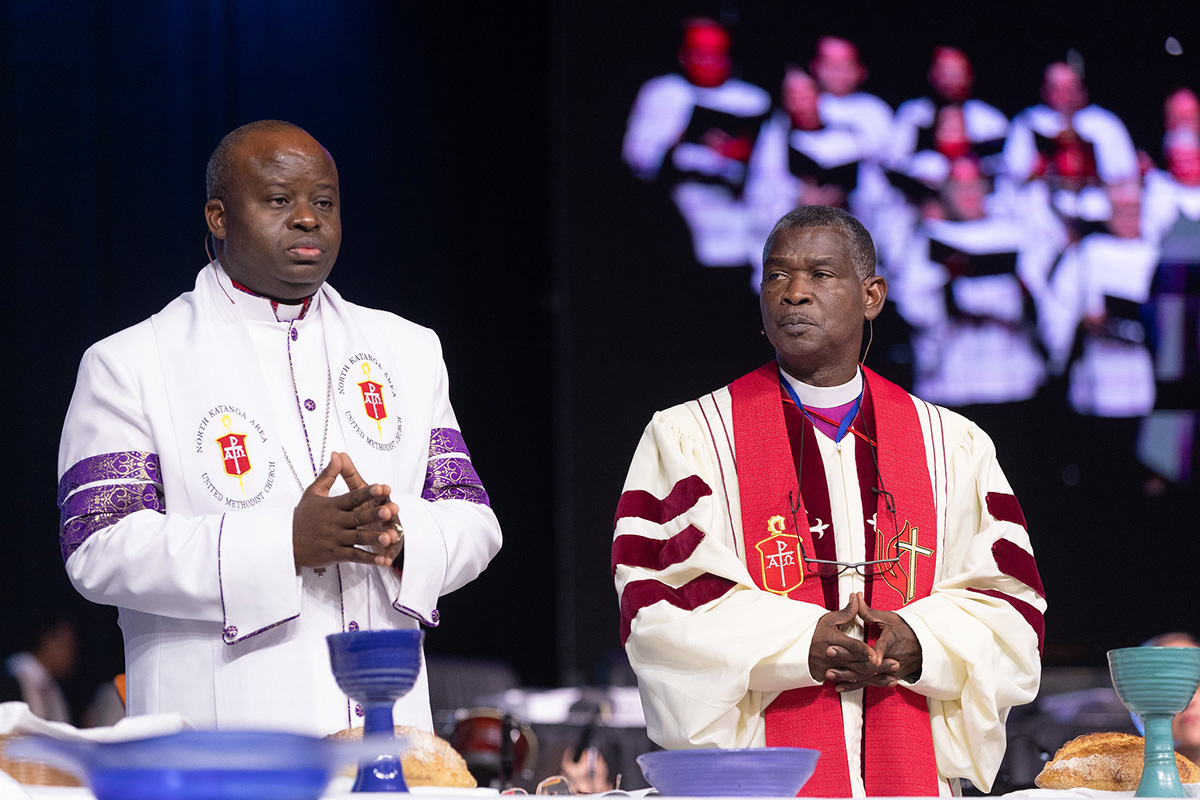
General Conference delegates, church leaders and alumni celebrated the impact of Africa University and the support from United Methodists across the connection who have helped provide quality education to thousands of students.
True to its mantra, “Leaders are made here,” around 200 graduates stood up in the auditorium when called by James H. Salley, president/chief executive officer of Africa University Inc. and associate vice chancellor for institutional advancement for Africa University. The alumni included delegates, observers and volunteers at the conference.
However, following intense debate during the April 30 morning plenary, the body rejected continuing a resolution that makes Africa University a priority and would have earmarked an apportionment of $10 million for the university over four years.
Absent delegates in spotlight at General Conference
With General Conference well into its second and final week, the topic of missing delegates — particularly from Africa — keeps surfacing. The chair of the credentials committee provided updated numbers and emphasized the challenges the Commission on General Conference staff faced in identifying properly elected delegates.
Students, delegates join in protest for students protesting Palestine
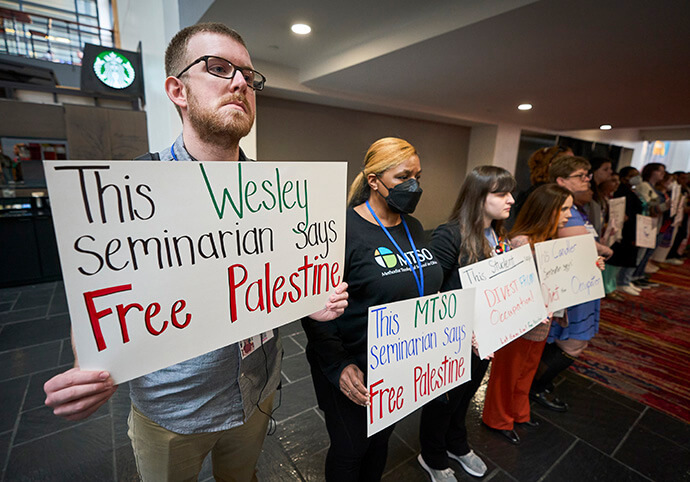
As the plenary session broke for lunch at the Charlotte Convention Center on Tuesday, a line of seminary students and supporters gathered in witness and protest for the ongoing conflict in Palestine — more specifically, the students who have been victims of violence as they’ve protested on college campuses around the country.
Holding signs for their various United Methodist-affiliated seminaries across the country, the students were greeted with more delegates, pastors and observers willing to hold signs and hold space for witness along with them.
“We’re here because we’re passionate about The United Methodist Church,” said Grace Rogers, a student at Candler School of Theology and young adult participant at General Conference. “A public presence here is meaningful.”
Malone is new Council of Bishops president
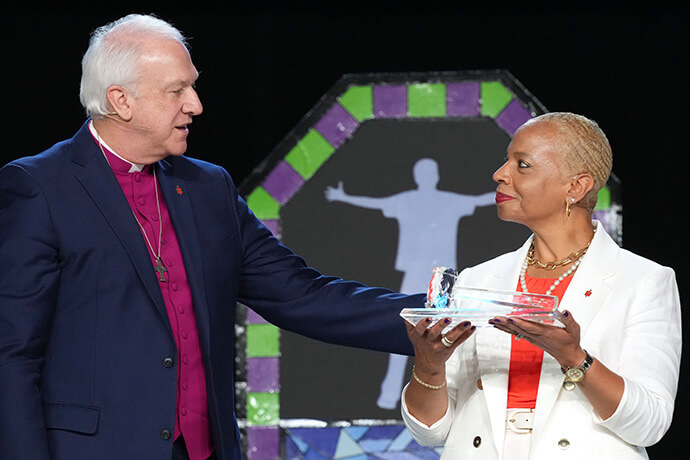
Bishop Tracy S. Malone, resident bishop of the East Ohio Conference, is the new president of the United Methodist Council of Bishops. Malone is the first Black woman in the history of the worldwide denomination to be elected president of the Council of Bishops.
Bishop Thomas Bickerton, outgoing president of the council, passed the mantle of leadership to Malone on the stage of General Conference at the end of the April 30 evening session. Her two-year term as president begins immediately and will conclude in May 2026.
“It gives me great joy to receive this honor that has been bestowed upon me, and I consider it a privilege for my colleagues to have elected me as the president of the Council of Bishops. To God be the glory,” Malone said.
Votes of note: Consent calendar edition
- In the April 30 morning session, delegates adopted three consent calendars including petitions that revise the complaint process for bishops and create a jurisdictional committee on investigation for complaints against bishops, modify pastoral authority to remove members and expand authority for closing or discontinuing local churches. Other petitions will reduce the size of several general agency boards; declare a commemoration of Juneteenth as a day of reflection, celebration and advocacy; and direct general agencies to develop resources that undergird the creation and strengthening of multicultural ministries.
- Delegates adopted a revised resolution on Korean Peace, Justice and Reunification submitted by the United Methodist Board of Church and Society. The resolution calls for several actions for peace on the Korean peninsula, including praying and working for the formal end of the Korean War and to replace the Korean War Armistice Agreement with a peace treaty. It also calls for advocacy to lift international sanctions through letter writing and petition efforts, and joining the World Council of Churches in observing each year the Sunday closest to Aug. 15, the day of Korean Liberation, as a day of prayer for peace and reconciliation on the Korean Peninsula.
- General Conference delegates approved adding five new Heritage Landmarks. Applications for Heritage Landmark status are reviewed by the United Methodist Commission on Archives and History’s Heritage Landmarks Committee, which makes recommendations to the General Conference.
The new additions are: Christ United Methodist Church (Honolulu), Helenor M. Davisson Cluster (Jasper County, Indiana), Lakeside Chataqua (Lakeside, Ohio), Union/Westmar College Campus (Le Mars, Iowa) and Wilcott United Methodist Church (Wilcott, Vermont).
In other news
- More than 1,000 volunteers have donned distinctive red aprons during the two weeks of the United Methodist General Conference, which continues through May 3. They’ve kept the event running like a well-oiled machine by answering questions and directing traffic.
- Africa University graduates are another group serving at General Conference. Continuing a tradition, the school’s alumni assume leadership roles as delegates, translators and interpreters at the worldwide gathering.
- During the morning session, Bishop Christian Alsted of the Nordic/Baltic Episcopal Area called for prayer for the thousands of people killed by war in Ukraine, Gaza and Eastern Congo.
This is the first time that the issue of the armed conflict in Eastern Congo has been raised at this General Conference. The eastern part of the Democratic Republic of Congo has been plagued by armed conflict for decades, causing immense human suffering and a considerable delay in development.
Jéthro Muyombi, a lay delegate from the South Congo Episcopal Area, had made a motion April 29 asking the General Conference to pray for Eastern Congo.
The Rev. Esther Furaha of the Kivu Annual Conference, the war-torn area, said it was a relief to attend a prayer for her country.
“The prayer brought me a sense of relief and gratitude to see the international community and my church mobilizing for the cause of my country," she said. "I felt comforted by the words of compassion and hope expressed during the prayer."
- The Hispanic-Latino community and the Latin American delegation at General Conference had celebrations at different locations in the city of Charlotte over the weekend. During a worship service April 28 at St. Andrew’s United Methodist Church, California-Nevada Conference Bishop Minerva Carcaño issued a call to strengthen inclusion in The United Methodist Church and reinforced the importance of the relationship with Latin America.
In the afternoon, the Hispanic-Latino community gathered at the First United Methodist Church of Charlotte to discuss migration. The Rev. Jack Amick, director of Global Migration and Special Assignments for the United Methodist Committee on Relief, and Cristian Schlick, a missionary from the Board of Global Ministries based in Central America, highlighted the work on migration issues carried out by UMCOR.
Amick said the world is not experiencing a migration crisis, but a crisis of hospitality, and churches can make a difference by expanding understanding of the issue and contributing to the transformation of hearts and relationships. Schlick closed with a reflection from our faith in Jesus: "Let us remember whom we follow. We follow a refugee."
Global Ministries has scheduled a Mission Roundtable for July 2025 in Panama, aiming to strengthen cooperative relationships with Methodist churches and organizations in Latin America.
Butler is a multimedia producer/editor for UM News. Contact him at newsdesk@umcom.org or 615-742-5470. UM News staff, Oregon/Idaho Conference communications manager Kristen Caldwell, South Carolina United Methodist Advocate editor Jessica Brodie and East Ohio Conference executive director of communications Rick Wolcott contributed to this report.
To read more United Methodist news, subscribe to the free daily or weekly Digests.

